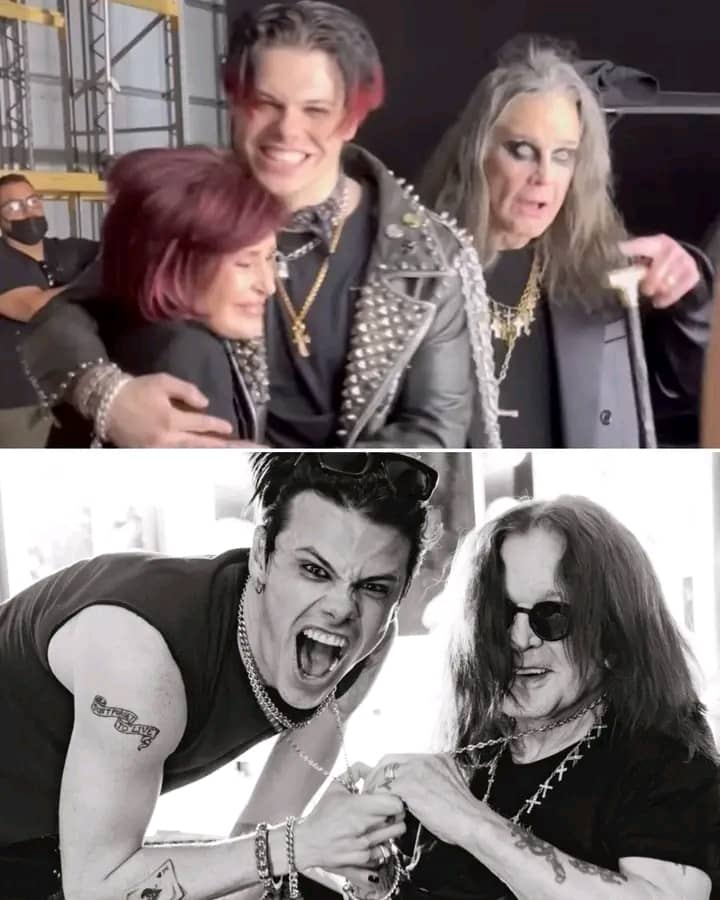
When I first heard the headline — “Yungblud pays tribute to Ozzy Osbourne” — I genuinely scoffed. I muttered to myself, “Who the hell is this guy?” Not out of anger, not even disrespect — just genuine, stone-cold ignorance. I didn’t know him. Didn’t care. Didn’t think twice.
But then I saw the thumbnail.
There was Ozzy. The Ozzy. The Prince of Darkness himself, leaning into a hug with this younger guy — wide-eyed, messy-haired, tattoos and all — during something called the Back To The Beginning tour. And for reasons I still don’t fully understand, I clicked.
And within minutes, everything changed.
Yungblud wasn’t just covering “Changes.” He wasn’t just performing. He was bleeding. Crying through melody. And by the time the final chorus rang out, I wasn’t just watching — I was feeling. I was crying. Not a soft tear rolling down the cheek, but real, ugly, cathartic sobs. Because in that moment, it was no longer about whether I “knew” who Yungblud was. It was about understanding why Ozzy did.
A Passing of the Torch — In the Most Raw, Human Way
Let’s back up. “Changes” isn’t just a classic. It’s a cornerstone. A deeply personal song Ozzy once sang with his daughter, Kelly, about family, time, loss — and ultimately, acceptance. It’s not something you just cover. It’s something you become.
Yungblud didn’t take the stage to show off. He didn’t modernize the track for clout. He honored it. He felt it. You could see it in the way his voice cracked at just the right moments — not for drama, but because he was holding back real grief. Maybe for Ozzy. Maybe for all of us feeling the passage of time. Maybe for something else. But it was real.
This wasn’t a tribute in the glossy, PR-packaged sense. It felt like something sacred. Like a son carrying the weight of a father’s legacy. Like a torch being passed, not with fireworks, but with a quiet, trembling hand.
Why Ozzy Loved Him — And Why I Get It Now
For fans of Ozzy Osbourne — whether Sabbath-era purists or solo-career diehards — there’s always been a question looming in the background: What happens to rock and roll when the legends are gone? Where does the soul go?
Watching Yungblud answer that question on stage with “Changes” felt like witnessing the genre heal. Not evolve. Not rebrand. Just heal.
And it makes sense that Ozzy saw something in him.
Yungblud may look like a product of this generation — punk aesthetic, Gen Z fire but his spirit is cut from the same cloth as the old legends. The chaos, the vulnerability, the refusal to fit into a neat, marketable box. He doesn’t just make music. He lives in it. Bleeds for it. Screams through it. Just like Ozzy did.
This wasn’t a young artist trying to be “edgy” or cash in on nostalgia. This was a son grieving a father in front of millions. A student bowing to the master. And Ozzy, wherever he was, must have felt that love.
Not Just a Cover — A Cultural Moment
Let’s be clear: this wasn’t just a performance. It was a cultural gut-punch.
The internet can often feel cold, sarcastic, and dismissive. But scroll through the comments under that video, and you’ll see something rare: unity. Metalheads, punks, pop fans, skeptics like me — all silenced by the emotional gravity of that moment. Because grief, love, and legacy don’t care what genre you belong to.
And let’s not ignore the symbolism. Ozzy Osbourne — the man once banned from cities, demonized by media, feared by parents — now being honored not with pyrotechnics and shock, but with tenderness. That’s the real full circle. That’s rock and roll maturing without losing its bite.
Why This Hit So Damn Hard
Maybe it’s the fact that Ozzy has been publicly battling health issues in recent years. Maybe it’s that we’re all grappling with time catching up to our heroes. Maybe it’s just that in a world that feels increasingly disposable, authenticity still floors us when we least expect it.
Yungblud didn’t need to prove anything. He didn’t need to be a “worthy” heir to Ozzy’s legacy. But he became one, the moment he let himself be vulnerable enough to cry through a song that wasn’t his — and somehow made it his anyway.
I Didn’t Care. Now I Do. And I’m Not Alone.
I started as a skeptic. I clicked for curiosity, maybe even a bit of judgment. But I left changed.
And I’m not the only one. Yungblud’s tribute is pulling in people who haven’t felt connected to modern rock in years. It’s reminding us that legacy isn’t about age or genre — it’s about spirit. And if that’s the standard, Yungblud isn’t just a worthy successor. He’s the real deal.
Rock and Roll Feels Safe Again
There’s a reason this moment hit so hard. We’ve been afraid. Afraid that when our legends leave, the heart of the music will go with them. That what comes next won’t honor what came before.
But Yungblud proved us wrong.
He honored Ozzy not like a fan worshiping an idol, but like family. Like a son. And in doing so, he didn’t just cover a song — he wrote a new chapter in rock history.
Ozzy saw it. He felt it. And now, so do we.
Thank you, Yungblud — for reminding us that grief can be beautiful, that legacy can be loud and tender, and that maybe, just maybe… the future of rock and roll is in very good hands.

Leave a Reply